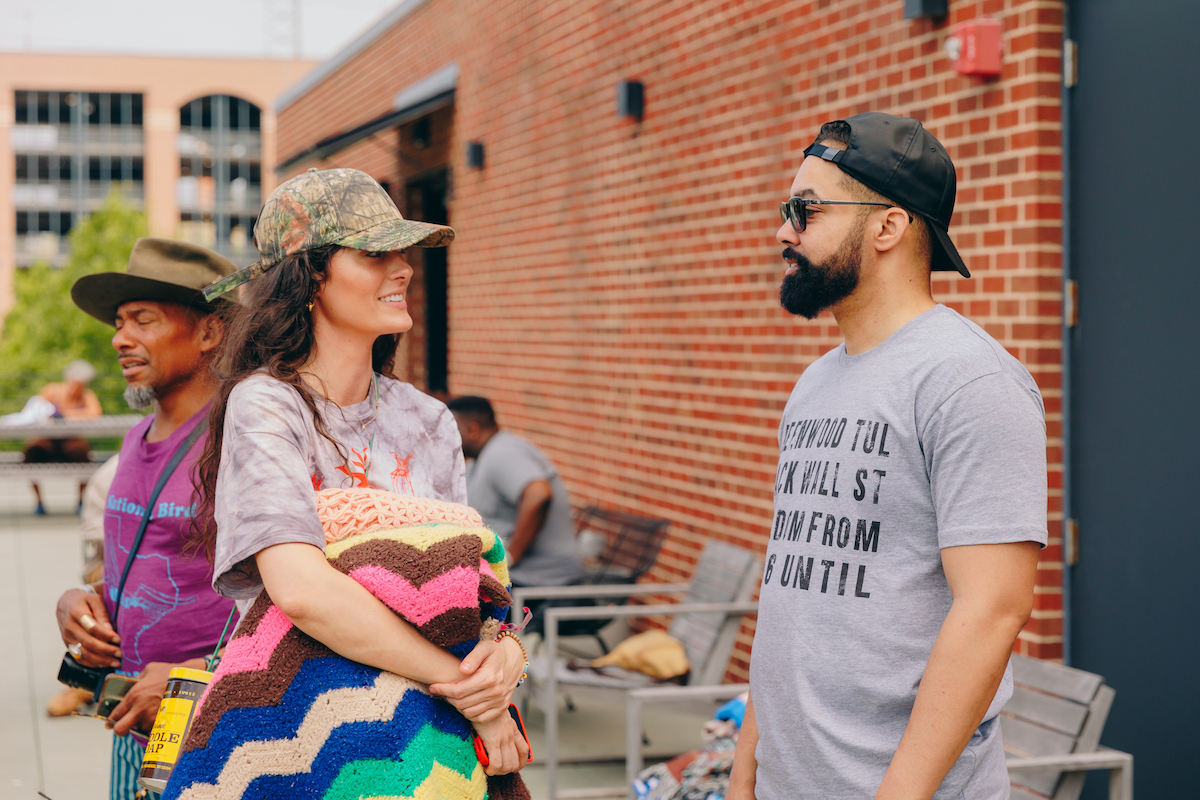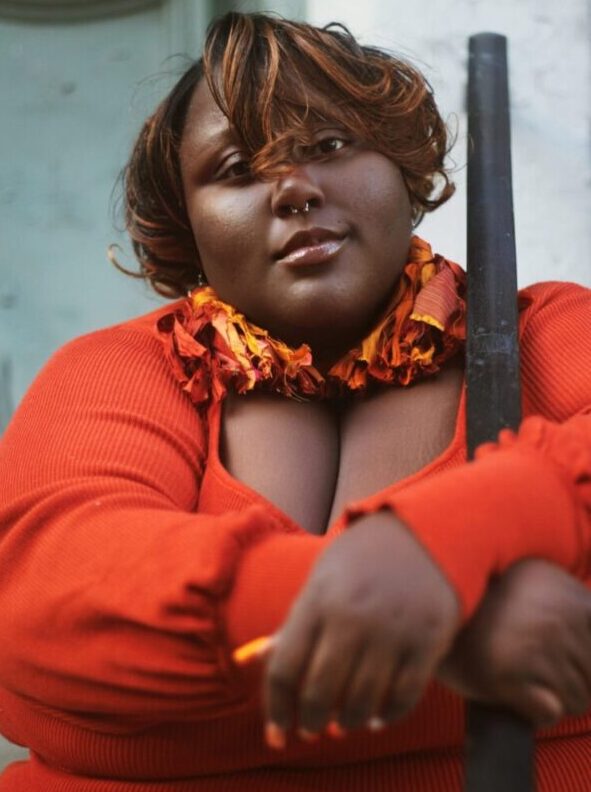Whether it relies on mobile phones, social media or other tech, digital activism offers a powerful tool for driving social and political change — in Pittsburgh, Tulsa, Baltimore and cities across the US. The practice is especially notable in the fight against racial inequities that disproportionately hurt those cities’ Black and other communities of color.
Jasiri X is one of a group of Pittsburgh activists and artists expertly using their voices and art to tell their stories and effect real change, as well as providing opportunities such as grant-writing workshops and digital canvassing. For instance, 1Hood, the nonprofit and collective Jasiri cofounded and leads, organized a campaign around the trial of the police officer who murdered Antwon Rose Jr., asking everyone to wear purple on its first day. Due to Rose’s mother’s request not to protest during the trial, protestors had to find creative ways to make their voices heard, and digital canvassing became their go-to strategy.
According to Jasiri, during the aforementioned campaign, a local CBS affiliate shared a tweet containing false information about Rose committing a drive-by shooting and having gunpowder residue on him. Despite the police holding a press conference to confirm the information was false, the outlet still left the story up. 1Hood took to social media to organize calls for the outlet to take the story down since right-wing individuals were still sharing it. This effort eventually led to the story being taken down.
This is but one example of 1Hood’s collective of socially conscious artists and activists making a real difference using tech platforms.
Of course, technology will continue shaping our world in ways we cannot yet imagine, particularly with the further development of AI-driven platforms and social media. Technical.ly caught up with Jasiri X further while he was on a “Breakout” during Breakout LLC’s recent eponymous nationwide convening in Tulsa. Here are some highlights from the conversation about digital activism and social media’s future. It has been edited and condensed for length and clarity.

Jasiri X (right) speaking with a fellow Breakout Tulsa participant. (Courtesy photo by Stephanie Montelongo)
If Elon Musk’s Twitter is dying, what role do you believe social media will continue to play in modern-day political activism in Pittsburgh and beyond?
I don’t think Twitter is dying. I think Twitter is intentionally being dismantled, similar to how foreign agents would go into a government and purposely dismantle a system. I think Elon Musk and the people that helped him purchase Twitter understood how activists like myself, 1Hood and others were using Twitter. Twitter is how [people] found out about Trayvon Martin. I have a tweet saved from when myself and some other artists were added in a tweet about Mike Brown. Looking back to the events at Ferguson, CNN wasn’t actually giving us the real story, but getting tweets from folks on the ground — folks who would give me the real of it while I was unable to go there myself — was pivotal in that moment.
I think Twitter began to democratize voices. We were able to find ourselves as a community and use that power to make something important trend, right? I remember the Occupy Wall Street movement, I remember the conversation surrounding Troy Davis when he was executed. There are too many moments to name where access to digital storytelling was key. I think that because of the success that we had online, what we’re seeing happen right now online and in person is a direct response to a worldwide uprising.
And do you know why I think that is? Because of the amount of young white people that stood beside us in every movement.
That’s why it’s important to folks like Elon Musk and many others to dismantle the ability to connect with folks. I found through my own research that one of the things that happened in Pittsburgh in near history is that police created a separate entity to look at social media and to begin to find what they would deem crimes on social media.
I think lingering questions for those in positions of power are: Why are these young white kids standing with the Black people? What are they learning? Van Jones coined the term “whitelash” [a political term that refers to resistance by white voters against social progress among minority groups]; we’re seeing that with social media.
So if the question is, do I believe that social media will still be relevant to digital activism? Yes. Because we have other social media tools [outside of Twitter] and people are still using Twitter. What social media does allow us to do is connect across cities and across nations. People want that connection. So even if one app goes away, something else will come in. Part of what we have to start thinking of as a community, though, is: How we can create and popularize our own media that we own and control?
How is 1Hood using both hip-hop and its digital footprint to grab the attention of people in Pittsburgh who don’t ordinarily pay it to political topics?
In 2020, 1Hood began a series of town halls online. Conversation titles like, “What Black Pittsburgh Needs to Know,” “Ask a Black Doctor,” “People, Politics & Power” or “This Week in White Supremacy” all compel our online audiences. The titles are provocative. At 1Hood, our entry into politics was really about how to build Black power and how to build it with voters that didn’t normally, or that have given up on the political process out of rightful frustration. For us, the titles of our shows indicate the framing that we ultimately want in our political processes.
It’s about power and bringing up people like Lupe Fiasco, David Banner or Bun B [reflects] that one of our core tenets is to use hip hop, our culture, as a base. We use that to bring people to space that might not be interested in voting. Lupe has a critique on voting that we felt powerful to share; he pretty famously went back and forth with folks nationally because he said he would not vote for Obama. We were able to have that conversation publicly in front of a crowd and then, you know, produce that video of that conversation to spread digitally for years to come.
Congrats on 1Hood just wrapping up the Vision Into Power (VIP) Cohort. How did your time in the cohort influence your plans for accelerating and scaling 1Hood’s impact?
The approach that both 1Hood and VIP take are similar, particularly as it relates to approaching artists to help amplify political topics. It was really cool to be a part of something where we didn’t have to explain to the leadership what we’re doing at 1Hood. I don’t know if you saw “UnPrisoned,” a Hulu comedy starring Kerry Washington, but it is based on creator Tracy McMillan’s own experience as a woman confronting ups and down when her father is released after 17 years in prison. The aim with Kerry’s show is that she’s really talking about the difficulty for somebody experiencing reentry. We similarly use storytelling to amplify heavier topics at 1Hood through our various series.
To her credit, Kerry has been very intentional, she didn’t just write a check. She’s been listening to us, helping us with storytelling, helping us with social media. Her and her team’s presence — and also the trainings that they’ve given us around storytelling and social media — have helped us to expand the reach of what we’ve already been doing at 1Hood. I don’t believe we would have had the success that we have politically within the last year that we have, were it not for the trainings from The VIP Team. We’ve seen a lot of celebrities come into the activism and digital activism space, but not with that sort of intentionality around really helping us to make this cool. I think that’s part of what we try to do at 1Hood: We try to make this shit cool.
Join the conversation!
Find news, events, jobs and people who share your interests on Technical.ly's open community Slack

Delaware daily roundup: Equity Action Summit video; DE Senate debates wind energy; Hydrogen hub listening sessions

Philly daily roundup: Student-made college cost app; Central High is robotics world champ; Internet subsidy expiration looms

Delaware daily roundup: Early-stage loan help; Jobless rate drops below 4%; $700k grant for industrial park



